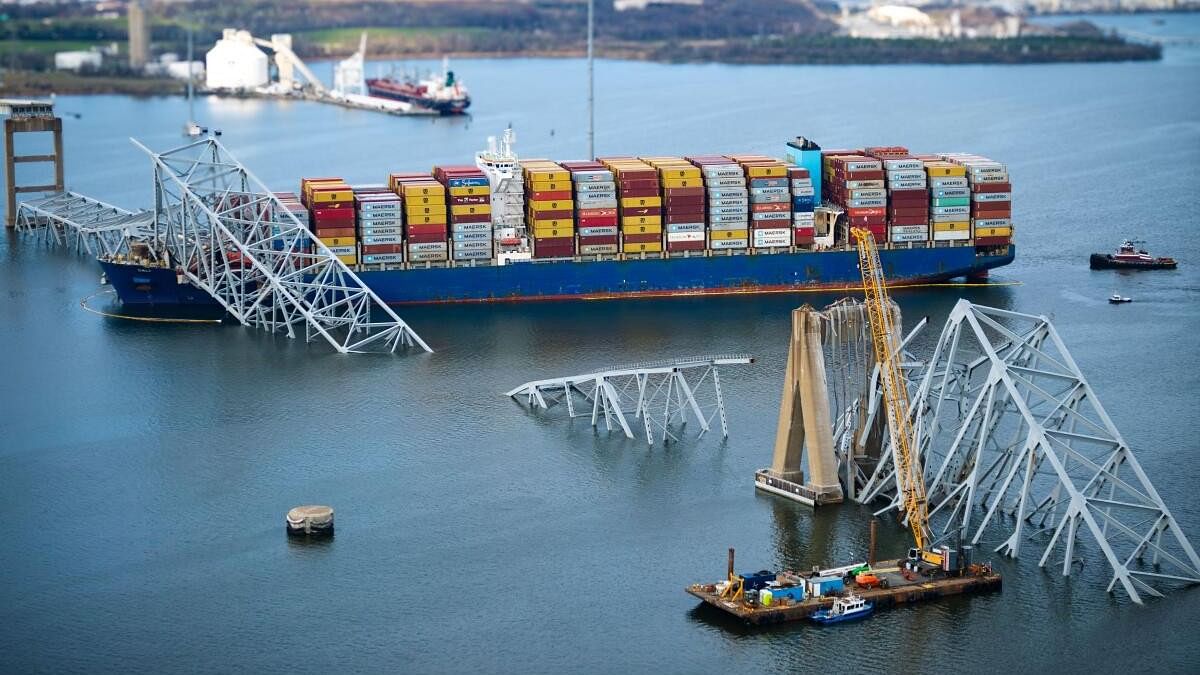
The Singapore-flagged cargo ship Dali is seen stuck during an overflight assessment of the Francis Scott Key Bridge collapse, as a crane ship is anchored nearby in Baltimore.
Credit: Reuters Photo
The biggest operational crane on the US Eastern Seaboard towered over Baltimore's port on Friday, ready to begin clearing the wreckage of the Francis Scott Key Bridge days after a cargo ship crashed into it, sending the span crashing into the harbor.
Crews were still surveying the damage as of midday Friday. The crane, which can lift up to 1,000 tons, arrived late Thursday night and will probably start hauling debris out of the water on Saturday morning, according to US Coast Guard spokesperson Carmen Carver.
A second crane is en route and expected to arrive soon to assist the effort, she said.
State and federal authorities are focused on clearing the busy port and rebuilding the bridge after the Dali, a massive container ship that had lost power, plowed into a support column early on Tuesday, toppling the structure and leaving six workers presumed dead.
Divers have recovered two bodies of the missing construction workers, who were repairing the bridge at the time of the collision. The remaining four are believed to be trapped beneath the water. All were immigrants from Mexico and Central America.
Finding the remaining bodies is the top priority, Maryland Governor Wes Moore told a press conference on Thursday. Crews must also assess how to remove the stuck vessel, loaded with thousands of containers and trapped by bridge debris.
"The Dali is almost as long as the Eiffel Tower, and the Dali has the Key Bridge on top of it. We're talking 3,000 or 4,000 tons of steel that's sitting on top of that ship, so we've got work to do," Moore said at Thursday's press conference.
Within hours of Moore's request for emergency funds, the U.S. government on Thursday had awarded Maryland $60 million to clear debris and begin rebuilding the bridge, a reflection of how critical the infrastructure is to shipping and transportation industries along the Eastern Seaboard.
Three days after the tragedy, the jobs of some 15,000 people whose work revolves around daily port operation are on hold. Maryland lawmakers are looking to pass emergency legislation to provide income replacement for those affected, the state senate president said this week.
The situation poses a temporary risk to the area's economy, since the port receives the greatest share of U.S. auto imports and is one of just four on the U.S. east coast with the 50-foot channel needed for larger cargo boats, bond rating agency Moody's Investors Service said.
Replacing the 47-year-old bridge will likely require "years of work," but the port, whose operations recently surpassed pre-pandemic levels, could reopen within weeks, "if debris is rapidly removed," according to a Moody's report.
"As long as the port is closed, diversion of automotive imports and other cargo to other East Coast ports will erode Baltimore's advantage as the port closest to the Midwest, to the detriment of terminal operators," the report said.